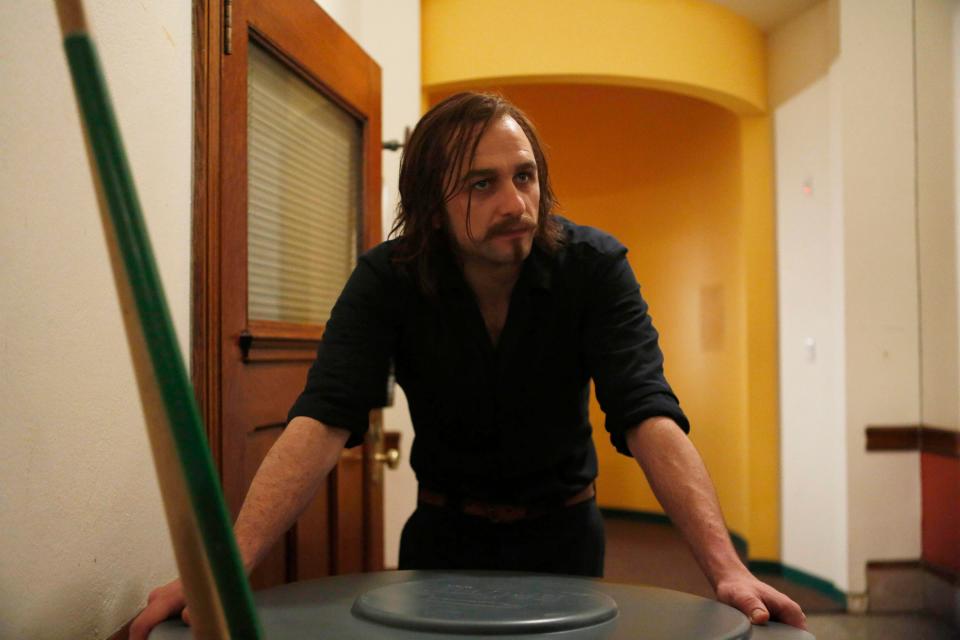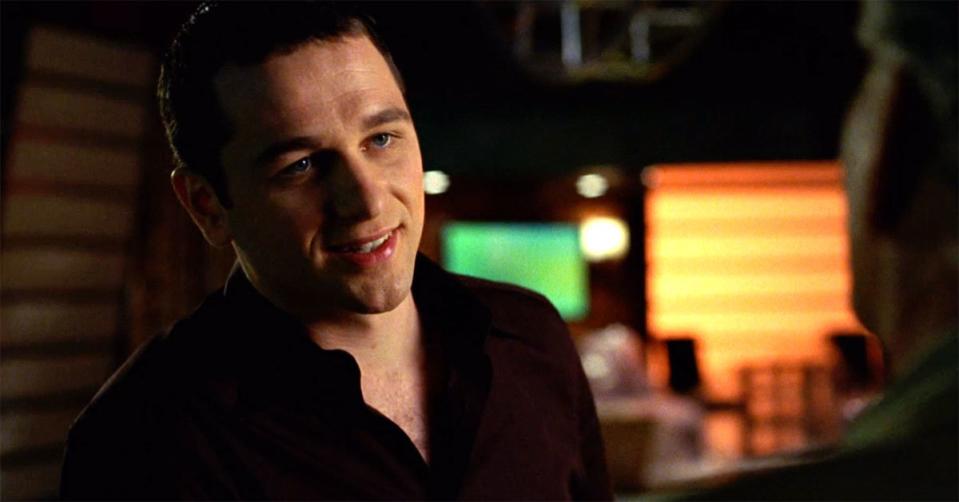Matthew Rhys on the Perry Mason Finale, What Happened to His Americans Character, and His Big Columbo Moment
As Perry Mason wraps up its (very good!) first season, Matthew Rhys is hunkered down in a cabin in the Catskills, where the trees are plentiful and wifi is limited. He’s spent isolation up here with his wife, former Americans co-star Keri Russell, and their blended family, mostly “trying to introduce the kids to as much nature as possible.”
If Rhys’s on screen personas veer towards the dark and brooding—his Perry Mason is a hard-boiled, hard-drinking private investigator suffering World War I flashbacks; Phillip Jennings on The Americans was a deadly and deeply conflicted Russian spy—his lively Welsh accent and mop of curls give him the charming air of a bon vivant. (Hosting a wine show, literally called The Wine Show, with actor Matthew Goode certainly doesn’t hurt either.)
GQ chatted with Rhys about the darkest moments from Perry Mason’s first season, what he thinks happened to his Americans character, and that one time he was on the last ever-episode of Columbo.
GQ: So, do you have a go-to pandemic wine?
MR: Yes. There's a Pomerol called De Sales. And we've been drinking it by the case.
Related, what’s the state of the quarantine beard right now?
Pretty bad. It's getting to that point now where it separates and you look like someone who can't take care of yourself. It always amazes me, those men who have beautifully coiffed beards. I appreciate how much work goes into it.
How familiar were you with the Perry Mason franchise beforehand? And did you read the books or watch Raymond Burr’s version to prepare?
I was very aware of the magnitude of it as a show, it was huge in the UK. But I never watched it myself. I had this image of Raymond Burr and someone breaking down in the stands all the time. I didn't go back to the books, because I've done that occasionally in the past, and I tend to lean too heavily on the book. Sometimes the way things are in a book are not necessarily in the script.
So just to keep my head a little clearer, I said, "I'm just going to stick to the script, and play what's in the script." I certainly didn't go to Raymond Burr because I know I'm a kind of unconscious thief who mimics. And whether I was aware of it or not, I know that something would go into my tiny brain that I would kind of regurgitate.
I think many people watching this are too young to have seen the original, so you probably did have free rein to do what you want.
Yeah, and what was refreshing was that, from the get-go, producers have said, “look, this is a re-imagining of Perry Mason, it has no bearing on Raymond Burr's Perry Mason. The hope is that we're not even compared because it's basically a name alone.” We’re fortunate also that the estate was so flexible and malleable to the changes that we wanted to make. They were like, "Yeah, go for it."
Are you a noir fan, and did that influence your performance at all?
A little. I was a bit of a [Raymond] Chandler fan and a Humphrey Bogart fan. There were these big elements in the show, where I get to live out childhood fantasies of being those people, or flicking the cigarette. And that was a little thrill for me, because I've never done anything [set] in the 30s, certainly not on this scale. I feel like I was living out an exotic American childhood dream.
Perry Mason is, in every sense, a dark and gritty show. Were there any parts in the script that you encountered and thought, "Jesus, this is way too dark?"
Yeah, I still have reservations because what happened to the baby actually did happen in real life. That one element, as horrifying as it is, happened in Los Angeles in the 30s. There was this huge case.
Oh, wow, I didn’t realize.
Yeah, it happened to a kid. Our original version was actually worse because we based it on key elements of this kidnapping that went wrong. And then I think we collectively [couldn’t] go the whole way on it, because it was too dark. But it's interesting because Mason is a PTSD-affected veteran of the first World War, who, as a result, is estranged from his wife and his child. I think if you’ve seen the kind of atrocities and horrors the World War I veterans saw, there needs to be something to capture you. To a degree, they needed that extreme to pull Mason out of this moment and to propel him to what he does.
I'll have to look into the real case.
Yeah. Or don't.
Was the trial in the show always going to culminate the way it does?
They were toying with a number of things right up until the end. In a television series, you write one thing and then you see it transpose into something else. Especially in the first season, there's always an element of trying to catch up, or realizing what the beast you've created is rumbling into. So there were a number of ideas thrown around at the end, but I was happy that they decided it should be a stalemate. I wonder if it would have been a step too far for Mason to win, obviously: "Oh God, of course he's going to win." Or whether for her to be found guilty would have been too depressing, having invested in eight hours up until that point. So I thought it was a good way to end it where you've checked a number of boxes.
Will season two have a different case for each episode, like the original series, or is it going to focus on one crime for the duration of a season again?
From conversations I've had thus far, it could be anything at this point. They don't even know when we can shoot it, because obviously the COVID regulations are so stringent, and obviously the kind of show we shot with 200 people all the time. So, I have no idea what the next season’s going to be, whether it could be one case, eight cases. I think we just have to wait and see whether you can shoot those courtroom scenes again, or whether Perry goes to prison and is solitary confinement for eight hours.
I have a few quick Americans questions if you don't mind humoring me. First, either you—or an unverified account elaborately impersonating you on Twitter—recently tweeted out that many of the wigs were shared between characters on the show.
Yeah, that is my Twitter account. And that's true, we did share wigs because there wasn't much of a wig budget. It was easier for Keri because she has a much smaller head than me.
Did you have a favorite wig?
I did, yes. There was this one character, he was kind of like a janitor. He came back like three or four times. He had long hair and sometimes there would be a mustache and a soul patch on the chin. I liked his wig.

Do you ever think about what happened to your Americans character after the show ended?
We joke about it sometimes. They're in this kind of kind of Moscow flat arguing. Or they're walking down the street and they see Martha.
So your theory is that they survived?
I think basically they both became kind of alcoholics, and they just bickered about all the missions that went wrong, and why they went wrong, and whose fault it was because they don’t have anything better to do. And then Elizabeth keeps accusing Philip of being in love with Martha. And he's like "I don't! I don’t love her, I never loved her." And Philip always wants to speak English. And Elizabeth’s like, “SPEAK RUSSIAN!”
As someone who worked with your partner for many years, do you have any advice for this current moment, when many of us are working from home with our spouses all day?
Alone time. And you don't need large real estate for that. Lock yourself in a cupboard. Whatever it takes to give yourself the alone time.
I was going to ask if you’re ever going to use your Welsh accent on television, but then I realized you did—playing the villain in the last-ever episode of Columbo. Did you know it was going to be the last going in?
No, no, we didn't at all. And that was a crushing moment for me because I always pride myself on working hard at dialect and accents. And Peter Falk, said “I want [your character] to be a Cockney from London.” So I worked on my Cockney accent. And he picked me up at LAX—Peter Falk picked me up when I landed at LAX. Unbelievable. In his Range Rover. Walked into arrivals. It still blows me away.

Nice.
Then he goes, "I want to rehearse right now." I was like, "Oh! Okay." So we drove to Universal, we drove to his office, and we're rehearsing for a few minutes and I'm giving my best London Cockney that I've worked on. And he went [Peter Falk accent] "Where are you from?" And I said, "Oh, I'm from a place called Cardiff in Wales." He said, [Peter Falk accent] "Why don't you play him as a guy from Cardiff in Wales." And I was like, “Oh my God, Peter Falk just destroyed my Cockney accent.” So it was kind of a crushing moment for me, but yes, I did get to use my own native accent in the last-ever Columbo.
So would you ever do a gritty reboot of Columbo?
In a heartbeat. Just so I can say, “just one more thing.”
I was foolish enough, or lucky enough, to try on his coat. Because I went into the wardrobe trailer on the last day and said, "Can I try his coat on?" And they went, "Are you on drugs? Are you high? No one gets to touch the coat! That's why we wear gloves when we hold the coat, it's in a special bag. No one touches the coat." And I went, “oh, I’m so sorry.” Because he kind of had the same coat from 1969, I think, it's like his lucky coat. So I went back to my trailer at lunch time and there was this quiet knock on the door and one of the costume girls is there with the coat. And she went, "Just be really quick and don't tell anyone." And I tried it on, and there's a photo of me wearing the Columbo coat.
This interview has been edited and condensed.
“The money guys, I don't know. I just don't have a whole lot of fondness for those guys.”
Originally Appeared on GQ


